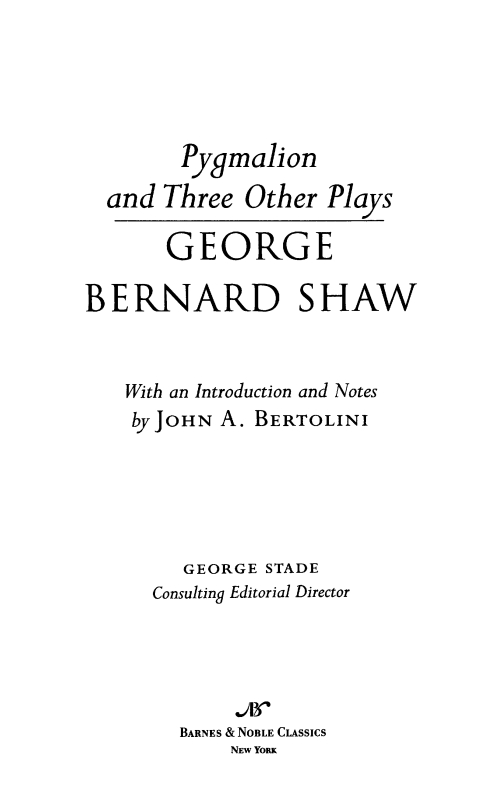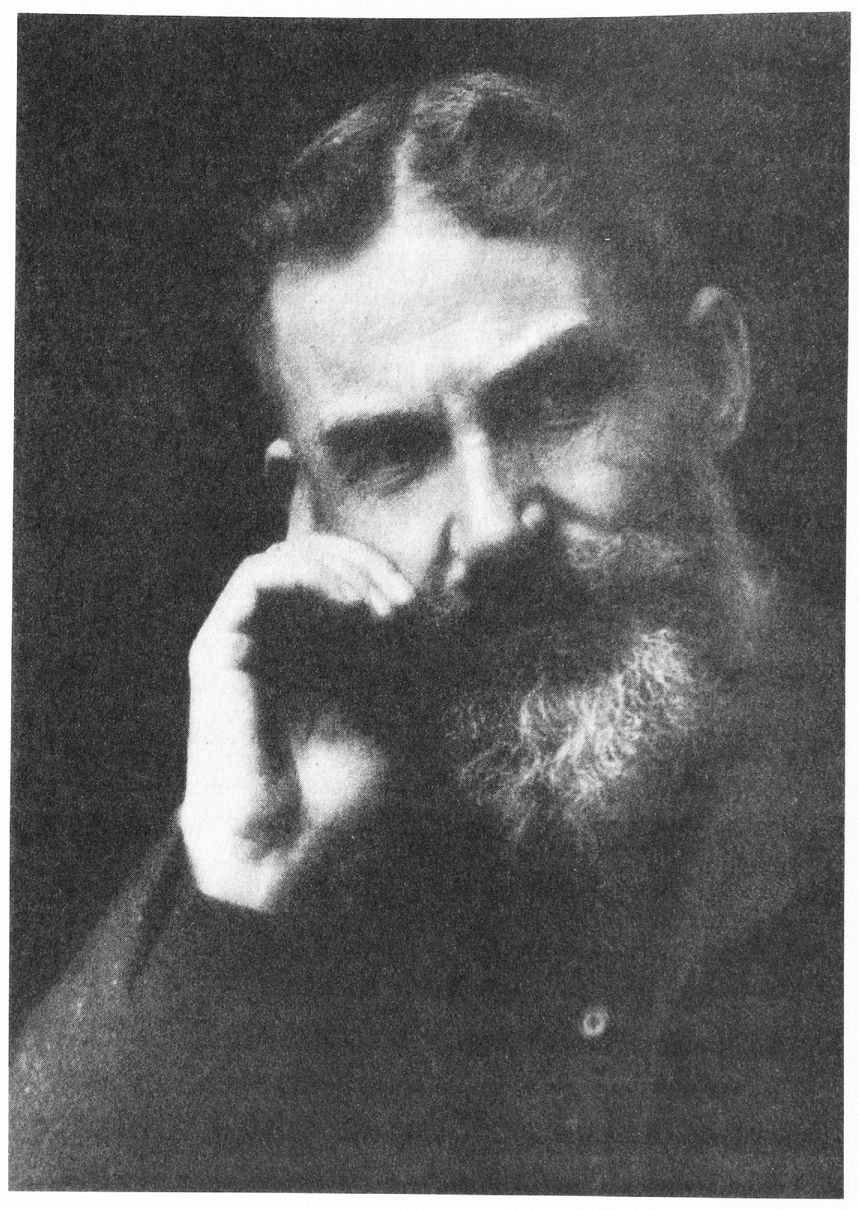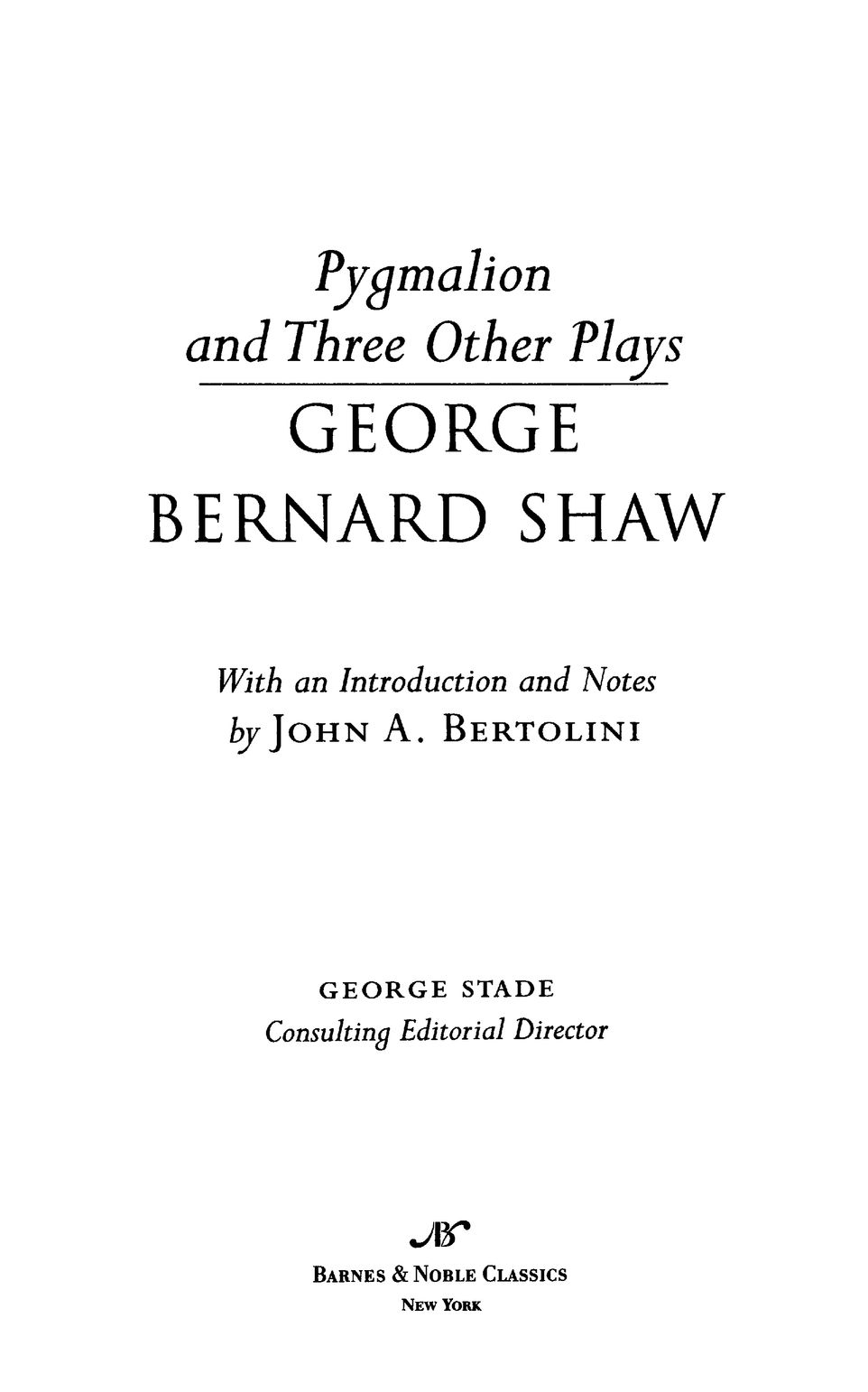Pygmalion and Three Other Plays (Barnes & Noble Classics Series)
Read Pygmalion and Three Other Plays (Barnes & Noble Classics Series) Online
Authors: George Bernard Shaw

BOOK: Pygmalion and Three Other Plays (Barnes & Noble Classics Series)
3.71Mb size Format: txt, pdf, ePub

Table of Contents
FROM THE PAGES OF
PYGMALION AND
THREE OTHER PLAYS
PYGMALION AND
THREE OTHER PLAYS
I am, and have always been, and shall now always be, a revolutionary writer, because our laws make law impossible; our liberties destroy all freedom; our property is organized robbery; our morality is an impudent hypocrisy; our wisdom is administered by inexperienced or malexperienced dupes, our power wielded by cowards and weaklings, and our honor false in all its points. I am an enemy of the existing order for good reasons.
(from Shaw’s preface to
Major Barbara,
pages 43—44)
Major Barbara,
pages 43—44)
“He knows nothing; and he thinks he knows everything. That points clearly to a political career.” (from
Major Barbara,
page 127)
Major Barbara,
page 127)
“You have learnt something. That always feels at first as if you had lost something.” (from
Major Barbara,
page 132)
Major Barbara,
page 132)
If you cannot have what you believe in you must believe in what you have.
(from Shaw’s preface to
The Doctor’s Dilemma,
page 166)
The Doctor’s Dilemma,
page 166)
“I find that the moment I let a woman make friends with me, she becomes jealous, exacting, suspicious, and a damned nuisance. I find that the moment I let myself make friends with a woman, I become selfish and tyrannical. Women upset everything.” (from
Pygmalion,
page 394)
Pygmalion,
page 394)
“The great secret, Eliza, is not having bad manners or good manners or any other particular sort of manners, but having the same manner for all human souls: in short, behaving as if you were in Heaven, where there are no third-class carriages, and one soul is as good as another.”
(from
Pygmalion,
pages 451 -452)
Pygmalion,
pages 451 -452)
“The surest way to ruin a man who doesn’t know how to handle money is to give him some.” (from
Heartbreak House,
page 568)
Heartbreak House,
page 568)
“His heart is breaking: that is all. It is a curious sensation: the sort of pain that goes mercifully beyond our powers of feeling. When your heart is broken, your boats are burned: nothing matters any more. It is the end of happiness and the beginning of peace.” (from
Heartbreak House,
page 596)
Heartbreak House,
page 596)



Published by Barnes & Noble Books
122 Fifth Avenue
New York, NY 10011
122 Fifth Avenue
New York, NY 10011
Major Barbara was
first published in 1907,
Doctor’s Dilemma
in 1909,
Pygmalion
in 1916, and
Heartbreak House
in 1919.
first published in 1907,
Doctor’s Dilemma
in 1909,
Pygmalion
in 1916, and
Heartbreak House
in 1919.
Published in 2004 by Barnes & Noble Classics with new Introduction,
Notes, Biography, Chronology, Inspired By, Comments & Questions,
and For Further Reading.
Notes, Biography, Chronology, Inspired By, Comments & Questions,
and For Further Reading.
Introduction, Notes, and For Further Reading
Copyright @ 2004 by John Bertolini.
Note on George Bernard Shaw, The World of George Bernard Shaw and His Plays,
Inspired by
Pygmalion and Three Other Plays,
and Comments & Questions
Copyright © 2004 by Barnes & Noble, Inc.
Inspired by
Pygmalion and Three Other Plays,
and Comments & Questions
Copyright © 2004 by Barnes & Noble, Inc.
All rights reserved. No part of this publication may be reproduced or
transmitted in any form or by any means, electronic or mechanical,
including photocopy, recording, or any information storage and
retrieval system, without the prior written permission of the publisher.
transmitted in any form or by any means, electronic or mechanical,
including photocopy, recording, or any information storage and
retrieval system, without the prior written permission of the publisher.
Barnes & Noble Classics and the Barnes & Noble Classics colophon are
trademarks of Barnes & Noble, Inc.
trademarks of Barnes & Noble, Inc.
Pygmalion and Three Other Plays
ISBN-13: 978-1-59308-078-5 ISBN-10: 1-59308-078-6
eISBN : 978-1-411-43300-7
LC Control Number 2003112512
Produced and published in conjunction with:
Fine Creative Media, Inc.
322 Eighth Avenue
New York, NY 10001
Fine Creative Media, Inc.
322 Eighth Avenue
New York, NY 10001
Michael J. Fine, President and Publisher
Printed in the United States of America
QM
3 5 7 9 10 8 6 4
GEORGE BERNARD SHAW
Dramatist, critic, and social reformer George Bernard Shaw was born on July 26, 1856, into a poor yet genteel Dublin household. His diffident and impractical father was an alcoholic disdained by his mother, a professional singer who ingrained in her only son a love of music, art, and literature. Just shy of his seventeenth birthday, Shaw joined his mother and two sisters in London, where they had settled three years earlier.
There he struggled—and failed—to support himself by writing. He first wrote a string of novels, beginning with the semi autobiographical
Immaturity,
completed in 1879. Though some of his novels were serialized, none met with great success, and Shaw decided to abandon the form in favor of drama. While he struggled artistically, he flourished politically; for some years his greater fame was as a political activist and pamphleteer. A stammering, shy young man, Shaw nevertheless joined in the radical politics of his day. In the late 1880s he became a leading member of the fledgling Fabian Society, a group dedicated to progressive politics, and authored numerous pamphlets on a range of social and political issues. He often mounted a soapbox in Hyde Park and there developed the enthralling oratory style that pervades his dramatic writing.
Immaturity,
completed in 1879. Though some of his novels were serialized, none met with great success, and Shaw decided to abandon the form in favor of drama. While he struggled artistically, he flourished politically; for some years his greater fame was as a political activist and pamphleteer. A stammering, shy young man, Shaw nevertheless joined in the radical politics of his day. In the late 1880s he became a leading member of the fledgling Fabian Society, a group dedicated to progressive politics, and authored numerous pamphlets on a range of social and political issues. He often mounted a soapbox in Hyde Park and there developed the enthralling oratory style that pervades his dramatic writing.
Other books
Killing Pythagoras (Mediterranean Prize Winner 2015) by Marcos Chicot
Outback Sunset by Lynne Wilding
Tempted by Alana Sapphire
The Body Looks Familiar by Richard Wormser
Blood Legacy: Heir to the Throne by Kerri Hawkins
The V-Word by Amber J. Keyser
The Energy Crusades by Valerie Noble
The Sandman and the War of Dreams by William Joyce
Beneath Gray Skies by Hugh Ashton
Undead Tango by Alexis Martin
